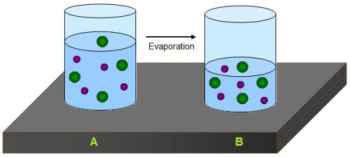Evaporation is a kind of vaporization that happens at temperatures lower than a liquid’s boiling point while Vaporization is a transition phase that occurs when a material transitions from liquid to gas; it encompasses both evaporation and boiling.
Here are some key distinctions between them to help you learn how they differ:
Vaporization Vs Evaporation:
What is Vaporization?
The vaporization method can be either boiling or sublimation.
The transformation from the liquid phase to the gas phase happens during the boiling process well above boiling temperature. It also occurs under the surface.
Sublimation is the immediate movement from the solid to the gas phase without passing through the liquid phase.
It also occurs at temperatures and pressures lower than the triple point of a material.
What is Evaporation?
The process of evaporation is a critical component of the water cycle.
Solar energy makes it viable. This energy enables water to evaporate from diverse water sources including oceans, seas, rivers, and so on.
It is also possible to calculate the rate of evaporation caused by moisture in the soil and other substances.
When water is exposed to the atmosphere, liquid molecules evaporate and produce clouds. This cloud then returns the water to the land as rain.

What is Difference between Vaporization and Evaporation?
Vaporization is the transfer of an element or compound from its solid or liquid phase to its equivalent gas phase whereas the evaporation process is the transfer from the liquid phase to the gas phase that occurs just below boiling temperature at the specified pressure.
So, what’s the difference? Let’s discuss the difference between them and how they are similar but not the same.
| Vaporization | Evaporation |
| Vaporization is a transitory phase that happens during the boiling or sublimation process of a chemical or element. | Evaporation is just a kind of vaporization that occurs at temperatures below the boiling point. |
| Vaporization is the transformation of materials from a solid or liquid to a gas. | While evaporation, elements in liquid form are transformed directly into gases. |
| Vaporization is often a quick and energy-efficient process. | Evaporation is a slower and more energy-intensive process because molecules have a strong inclination to transition to the vapour phase. |
| All of the water can convert into gas during vaporization. | Evaporation converts only the top layer of water into gas. |
| When vaporization happens, molecules may emerge from under the liquid’s surface as it boils. | The molecules evaporate solely from the liquid’s surface during evaporation. |
| Vaporization is the transition from liquid to gas when the vapour pressure is less than or equal to the surrounding pressure. | When the vapour pressure falls below the external pressure, evaporation occurs. |
Conclusion:
After a comprehensive study of the concepts, you should have a clear understanding of vaporization and evaporation.
Vaporization and evaporation, which is a subcategory of vaporization, are processes involving the transformation of a material from a solid or liquid state to a gas.
They are commonly used interchangeably, although few people understand the precise differences between them.
• Section Under Diff